Events surrounding Helen Joyce’s talk at Gonville and Caius
On October 25th 2022, Sex Matters’ Director of Advocacy Helen Joyce spoke at an event at Gonville and Caius College, University of Cambridge, entitled “Criticising gender-identity ideology: what happens when speech is silenced”. This page documents the events surrounding the talk.
Criticising gender-identity ideology: what happens when speech is silenced
The talk was hosted by Professor Arif Ahmed, a fellow of Gonville and Caius college. Helen was interviewed by Sir Partha Dasgupta about gender-identity ideology and the reactions to her work.
LGBT campaigners object
The event was planned to be held ina hall (the Bateman Auditorium) at the college. Professor Ahmed sent an invitation to faculty and student mailing lists on 13th October.
The Student Union LGBT+ Campaign responded with public statements of outrage and calls for the college to reconsider its decision to permit the talk to go ahead.
“We call upon Gonville and Caius College to reconsider its decision to host this event out of respect to its student community”
Cambridge SU LGBT+ Campaign
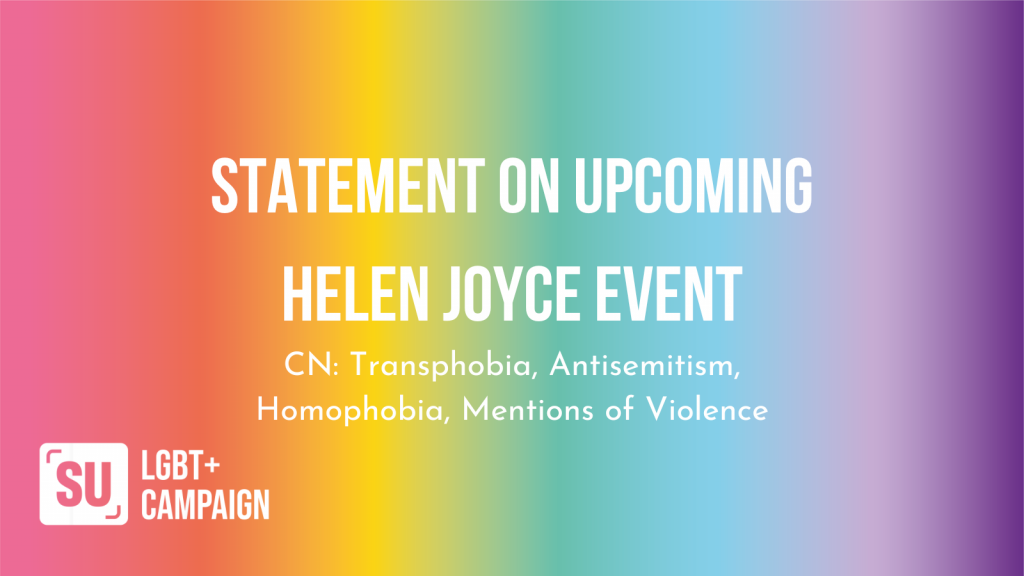
13th October: Statement on Upcoming Helen Joyce Event (Posted on Facebook)
The LGBT+ campaign are shocked and highly disappointed by the decision to invite Helen Joyce, author of “Trans: When Ideology Meets Reality,” to speak at the university. Joyce’s book promotes harmful and outdated ideas about trans people and thus contributes to and profits from rising levels of hostility towards trans people in the UK. We strongly condemn the decision to host this event and publicise it via the mailing lists for students of the Divinity Faculty, Biological Natural Sciences and Medicine. The latter is particularly concerning as, in previous interviews, Joyce has advocated ‘reducing or keeping down the number of people who transition.’ To encourage student medics to attend this event is irresponsible given that they will be in future healthcare providers for trans people.
The event Joyce has been invited to speak at is titled ‘Criticising gender-identity ideology: what happens when speech is silenced.’ What is here referred to as ‘gender-identity ideology’ is in fact the belief that trans identities are valid and trans people should be supported in their transitions. Trans rights are not an issue of ideology, nor is the existence of trans people a hypothetical, philosophical debate. The reality is that trans people, especially trans youth, including students at this university, are an extremely vulnerable minority.
In addition to the ordinary challenges of university, trans students face additional difficulties due to discrimination and harassment. A 2018 Stonewall survey found that 36% of trans university students had faced ‘negative comments or behaviour’ from university staff in the year prior. Furthermore, the same survey found that one in seven trans university students considered dropping out or dropped out of their course due to discrimination from peers and staff in the year prior. By promoting the aforementioned event to its students, the Divinity Faculty and Biology Faculty contribute to the further alienation of trans students, to whom the university has a duty of care.
This event has been announced just six days after the Home Office published the information that transphobic hate crimes have seen a huge rise in the past year, with police in England and Wales receiving 4,355 reports – an increase of 56% on the previous year. It is therefore highly irresponsible to platform Joyce, whose book seeks to propagate ideas that can drive such violence and hate-speech. For example, Joyce makes the damaging claim that the gay rights movement was ‘infiltrated’ by paedophiles and that the trans rights movement is likely to be exploited in the same way. Joyce also claims that people might identify as trans-women for reasons of sexual gratification, a claim which contributes to the non-consensual sexualisation the trans community already faces.
Additionally, Joyce portrays those calling for greater rights and improved support for trans people as serving the ‘global agenda’ of the world’s wealthiest individuals. This is both extremely out of touch with the material realities of trans people, who face huge financial and institutional barriers to transition, and their activism, which is largely grass-roots and community-based. Moreover, the language used by Joyce draws on age-old antisemitic stereotypes. The implications of this are furthered by the fact that all three billionaires she highlights in an attempt to prove her claims are Jewish. Far from presenting well-researched theories, Joyce constructs an antisemitic and transphobic conspiracy theory that portrays two marginalised groups as either shadowy actors or their unthinking tools.
Joyce has made clear in her writing and other statements that she does not believe in the validity of trans identities, describing trans people as ‘a huge problem to a sane world.’ The LGBT+ Campaign condemns the decision of the Divinity Faculty and the Faculty of Biology to promote this event to its students. We call upon Gonville and Caius College to reconsider its decision to host this event out of respect to its student community.
The college LGBT officers also published an open letter:
“this is not an attempt to silence free speech… we implore Gonville and Caius to reconsider their decision to platform Joyce.”
College LGBT Officers
Dear all,
It has come to our attention that Gonville and Caius college, and the Divinity faculty, are hosting a speaker event on the 25th of October platforming Helen Joyce. This event has also been promoted by the Fac Bio to natural sciences, medic and vet med students. The title of the event is ‘Criticising gender-identity ideology: what happens when speech is silenced.’
Helen Joyce is a ‘gender critical’ activist, whose work largely focuses around anti-trans rhetoric and trans-exclusionary radical feminism. “Gender identity ideology” is frequently used as a dog-whistle for transphobic sentiment, cloaked in the language of free speech and scientific inquiry. It goes without saying that this kind of rhetoric is fundamentally against what we as LGBT officers stand for, and we are unanimously disgusted by the platforming of such views by Caius and the promotion of the event by the various faculties. Transgender identities should not be put forward as a subject for debate, and their existence is not an “ideology.”Colleges, and the wider university, have a duty of care to their students, no matter their gender identity. By inviting speakers with inflammatory and bigoted views to speak, the staff involved are allowing transphobia to proliferate within the university, lending it a level of credibility, and crucially, potentially putting transgender students in harms’ way. Transgender people are an at-risk minority group – according to the Stonewall School Report 2017:
92% of trans young people have thought about taking their own life;
84% of trans young people have self-harmed; and
45% of trans young people have tried to take their own life.
Further to this, just days before the event was announced, the Home Office published the past years’ statistics on hate crimes in the UK, which revealed that transphobic hate crime has increased by 56% from last year, with 4,355 reports being made in England and Wales. In light of these statistics, the platforming of a speaker with these transphobic views takes on a particularly alarming salience.
Freedom of speech, of course, is protected in law; Helen Joyce has the right to speak as she pleases. The core of the issue we take is with the senior staff and fellows who have chosen to platform this speaker, which we consider a violation of their duty of care. To invite a speaker whose publicly expressed views include advocating “reducing or keeping down the number of people who transition” both legitimises active transphobia and also alienates and hurts transgender individuals on a personal and emotional level. Furthermore, the fact that this has been promoted to medical students, who will inevitably treat transgender patients in their future careers, presents a further risk to trans individuals not just in the university, but in the wider community, with the potential for wide-reaching and long-lasting harm.
This is not an attempt to silence free speech, but rather, us exercising our own right to that speech in the face of an event which is, in our view, not only irresponsible but actively harmful and cruel to the transgender students at Cambridge. Trans people deserve a university experience as comfortable, safe, and joyful as everyone else, and the University should take an active role in ensuring that – a role that they have, on this occasion, failed to fulfil. It is for these reasons that we implore Gonville and Caius to reconsider their decision to platform Joyce.
If any individual feels unsafe, upset or troubled by this event, please talk to someone – your college LGBT officer, an SU representative, a college or university counsellor, or a charity helpline. We have attached some resources at the end of this letter.
With love and solidarity,
The college LGBT officers
College Masters agree
“we strive to make Caius an inclusive, diverse and welcoming home… we feel that events such as this do not contribute to this aim.”
PIPPA AND ANDREW
On 19th October Professor Pippa Rogerson, the college’s Master, and Dr Andrew Spencer, its senior tutor, (writing, they said, only in a personal capacity as “Pippa and Andrew”) sent an email characterising Helen’s work as “offensive, insulting and hateful”. It went to the college email to lists of undergraduate and graduate students, and was copied to all college tutors.
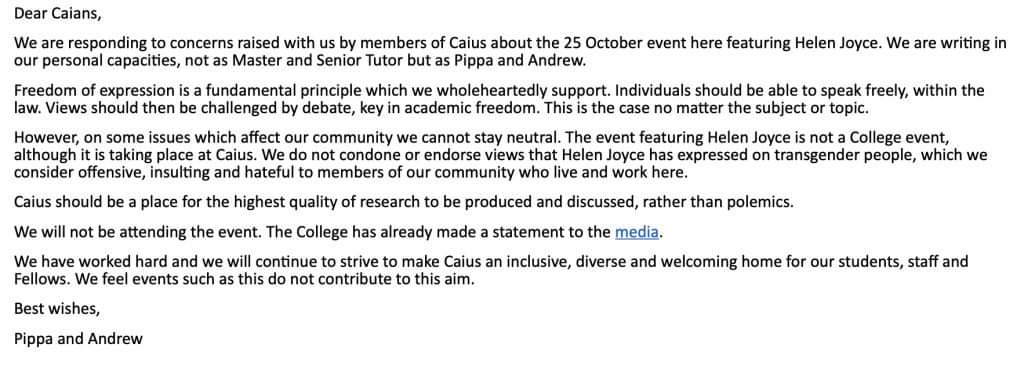
Helen Joyce responded in an open letter on 22nd October, which was also published in the Spectator. She has received no response.
College changes plans
On 24th October, the day before the event, the college decided that the event, which had been planned as open access, should be ticketed.
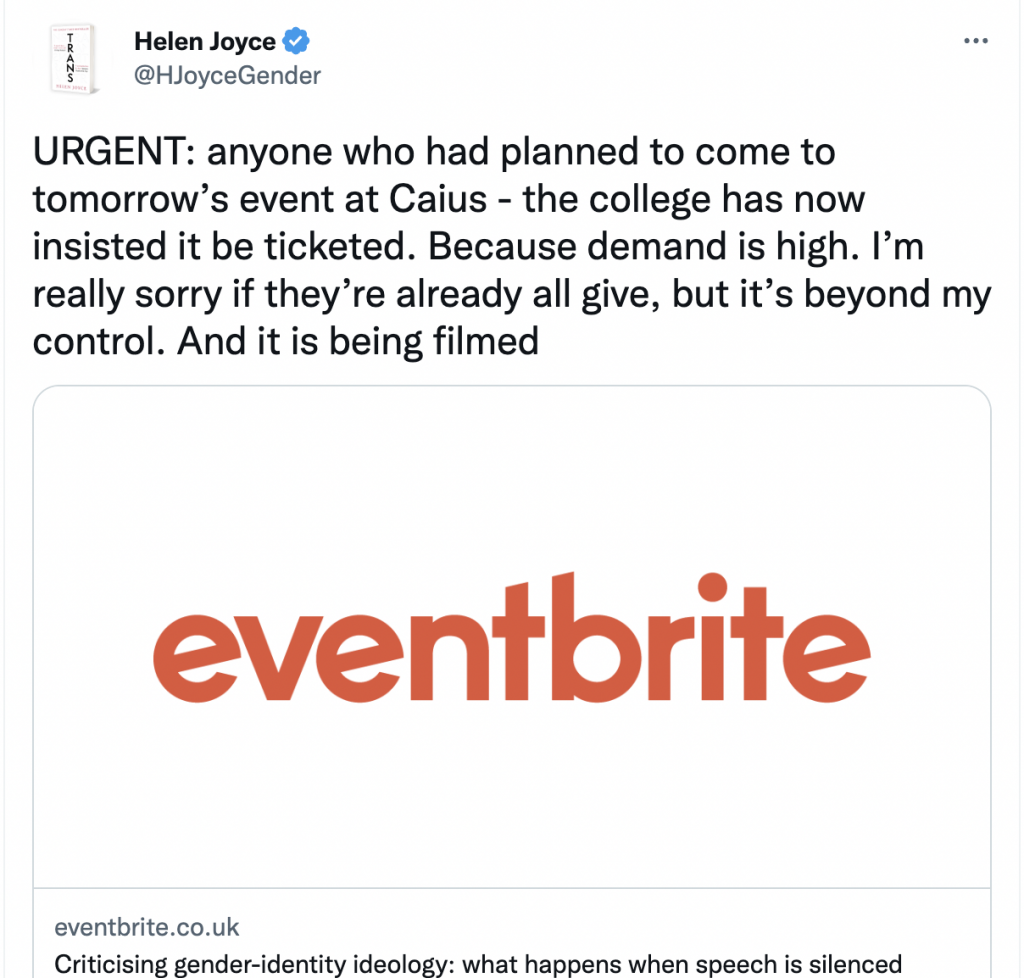
Tickets quickly sold out. Afraid that the event was being targeted by block-bookings intending to leave it half-empty, Professor Ahmed and Helen Joyce set up a stand-by list and booked a separate room for people on that list to wait in. The fear proved correct: the auditorium was filled on the night, but only because of the stand-by bookings and the waiting room.
Some students are afraid to attend
“A number of colleagues have told me privately that they support the event but are afraid to say so.”
Professor Arif Ahmed
Professor Ahmed says described how several students told him they felt afraid to attend (this was recounted later in an article by Professor Ahmed in the Telegraph).
…several students, mostly women, told me that they felt afraid to attend. This was not necessarily because they were frightened of violent protests. In a way it was worse than that. They were afraid of ostracism by their student peers, and even by academic staff. I therefore booked unobtrusive spaces where they could stay for up to three hours in advance, so that they could enter the hall without being seen.
A leaked email from this time was also later reported by Varsity. It shows that Professor Ahmed had emailed colleagues encouraging them to pass on the details of the talk on, and explaining that the Master and Senior Tutor had barred him from putting the details on the Venn (the College intranet system) because “further publicity will only inflame already heightened tensions in College”. The email states:
“A number of students, all women, have told me that they are afraid to be seen coming to this event, which they support, for fear of harassment from which they do not trust the College or University authorities to protect them.”
Professor apologises that the college publicised the event
“we are very sorry for the distress caused to you by the circulation of an email”
Professor Menali Desai
On 25th October, the day of the event, the head of the sociology department, Professor Menali Desai, wrote to students that college staff were sorry for circulating “harmful material” promoting the talk.
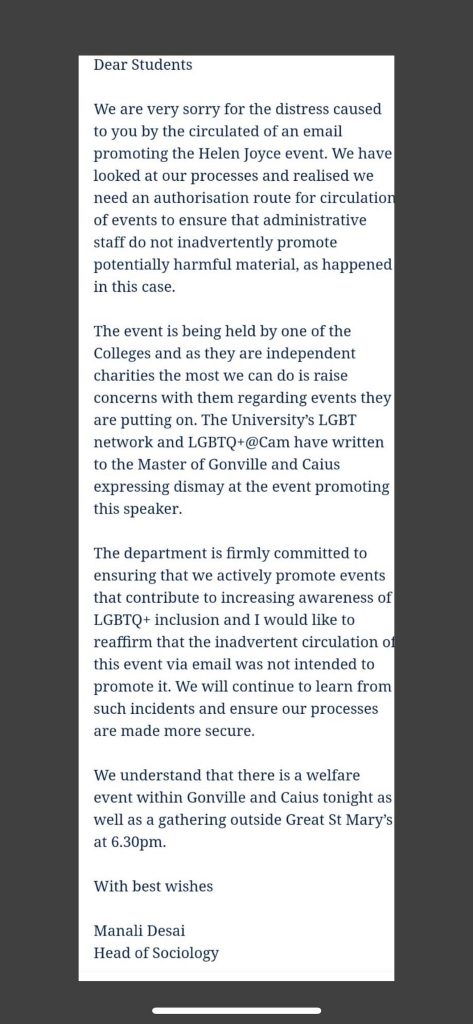
This was reported in the Daily Mail.
The event goes ahead
The event went ahead, and the video is shown above. Helen tweeted that night:
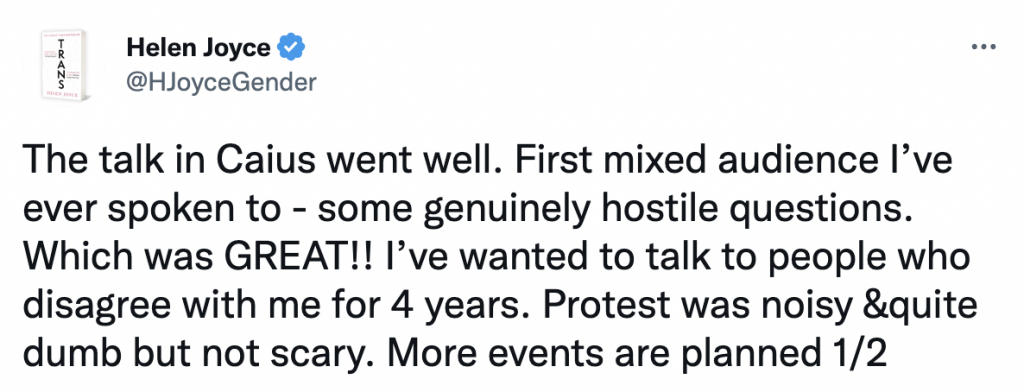
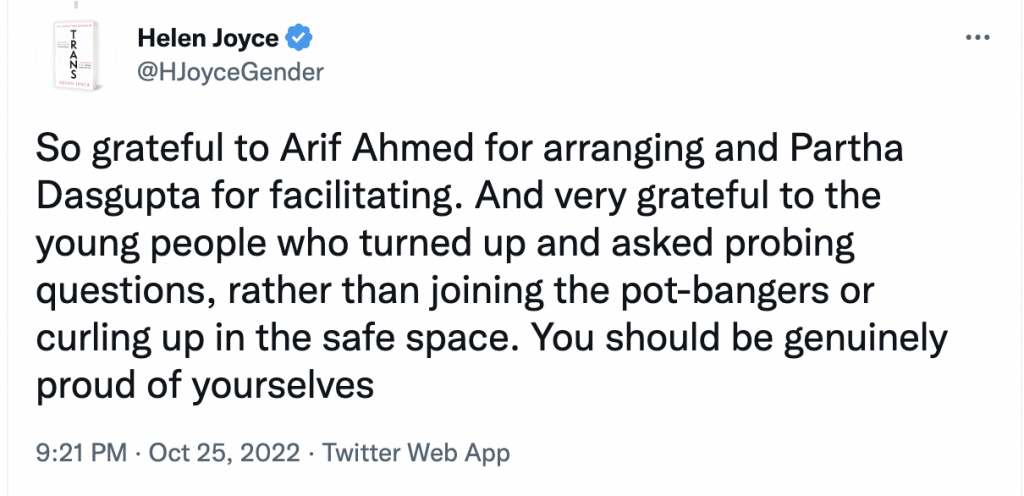
Students protest outside
There was an organised protest outside the college. The Tab reported on the protests (worth clicking through for both the pictures and the writing) that “Students from various colleges eagerly participated in the peaceful demonstration by banging pots and pans” and chanting.
The protest for trans rights, full of students and members of the public alike, had a joyful yet pensive atmosphere that left many passersby in awe, repeating chants such as, “Say it loud, say it clear, trans people are welcome here” and “Queer people united will never be defeated”.
Dr Peter Williams, passing by outside, reported on Twitter:
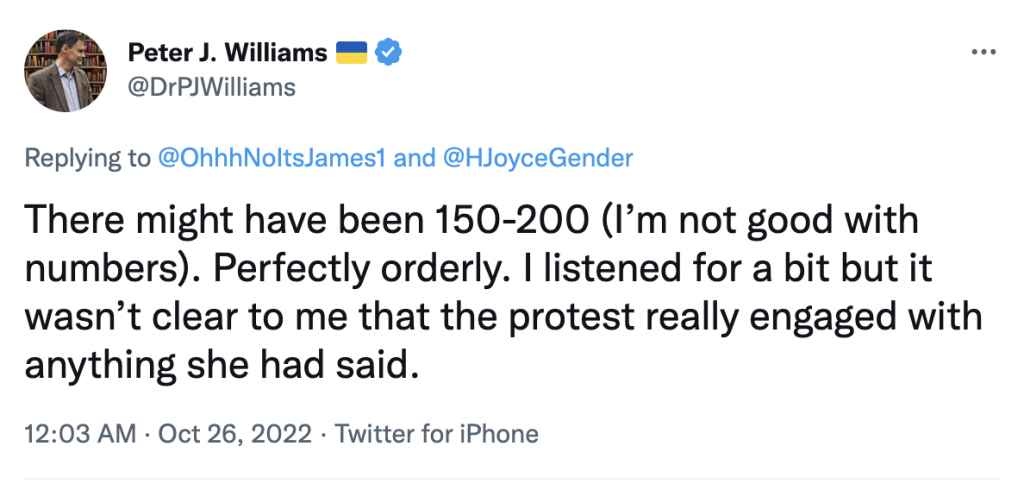
Students outside chanted “all TERFS are Nazis”
This was the outside view pic.twitter.com/eFBosmIZMT
— Emilie (@EmilieCope91) October 26, 2022
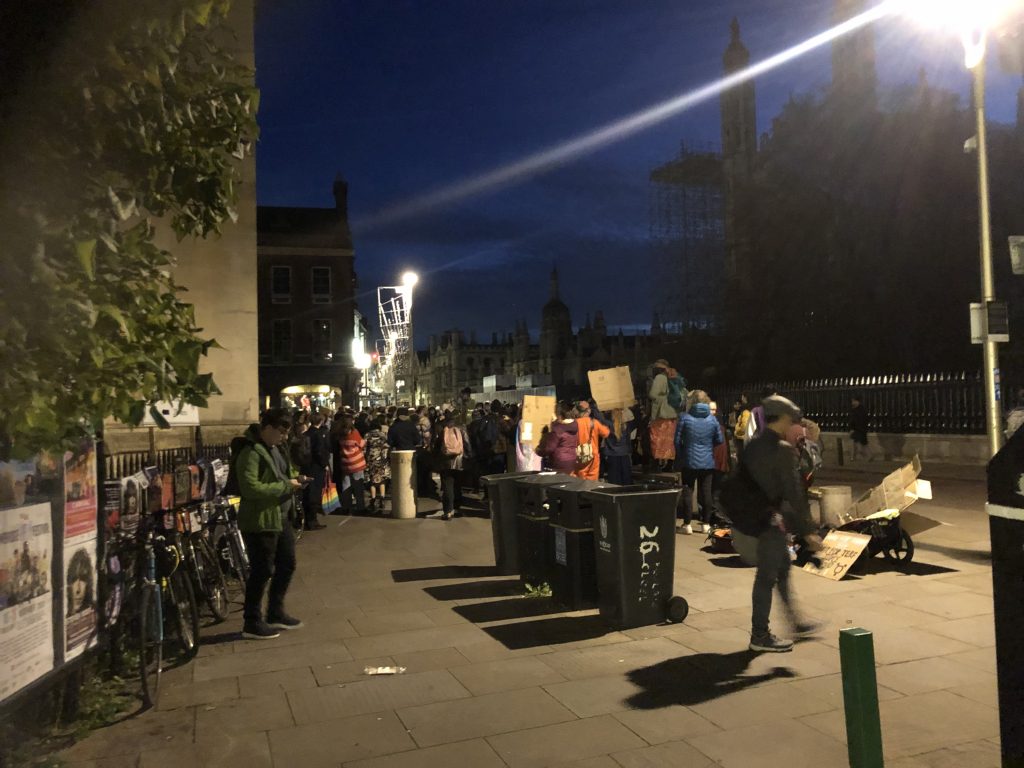
Noise is allowed to disrupt the event
There was also a break-away group which found its way inside and disrupted the event by seeking to drown it out with noise. Quoted in the Tab Professor Ahmed reports on this:
“There was chanting, screaming and banging outside the hall. Some people were banging on the door. But the event went ahead anyway, and it was a success – there were some challenging questions, and my only regret is that some of those protesting the event from outside were not instead inside the hall, objecting to Joyce with arguments rather than drums. I’d be happy to arrange another event, in the same venue or elsewhere, at which speakers on either side could have a constructive and peaceful debate.
A representative of the SU LGBT+ Campaign said that:
“For a brief time, about 20 protesters independently and spontaneously decided to split from the main protest group, which remained outside Great St Mary’s for the whole duration of Joyce’s talk. They did so in order to make noise closer to the Bateman Auditorium from Senate House Passage. These protestors did engage in loud drumming, which may have been mistaken as banging on doors. They purposefully made sure not to hit doors at any point and no attempt was made to enter Caius by protesters at any time. Any accusation to the contrary is false and misinformed. Our protest was entirely peaceful and lawful.
“Members of college security witnessed the action of this group and made no attempt to intervene as they understood that this group was entirely peaceful. It should be noted that the protest involved multiple groups with different plans of action, of which the SU was just one.”
Here is a short recording from inside the hall during the period when the group were banging outside the door.
You were an inspiration, Helen. pic.twitter.com/nEmMMt0tC5
— Babette (@proudgc) October 25, 2022
Alumni complain
The Telegraph on 29th October 29 reported that alumni had complained to the college. One wrote:
“Saying sorry on Friday and expecting money on Monday is not going to work because it’s clear from their attitude of mind that they do not support the idea of an academic college that I was part of which is free speech, free enquiry, allowing people to present their viewpoint without vilification. We don’t have that anymore, they’re now vilified before they even attend.”
Another said:
“I am embarrassed, I am appalled and I am absolutely disgusted with the stance taken by Professor Rogerson, the master of the college and the senior tutor… I think it is an appalling way to treat a woman who has gone out of her way to express her point of view and if we do not respect free speech in our universities, then the whole purpose of a university is gone.”
The group Alumni for Free Speech sent a letter to “Pippa and Andrew” and to Professor Desai.
Professor Rogerson says this is freedom of speech
“Students are encouraged to engage in challenging discussions about difficult topics”
PROFESSOR Pippa Rogerson
Following letters of complaint from alumni and donors, Professor Rogerson sent an email to students and alumni on 1st November (reported in the Times and the Telegraph), which said:
Dear Caians,
My colleagues and I have received correspondence from Caians (alumni, students, staff and Fellows) in recent days following publicity surrounding the Helen Joyce event which took place last week.
On this particular subject, I wish to share with you some background.
Some Caians raised concerns about the event, Criticising gender-identity ideology: what happens when speech is silenced, and did not want it to take place.
We did not consider a cancellation. Free speech is fundamental and disagreeing is part of academia. Students are encouraged to engage in challenging discussions about difficult topics at university and at Caius.
The event took place on Tuesday 25 October with practical assistance from the College to ensure everyone’s security.
I agree that there are difficult and complex discussions to have around bodily autonomy and parental relationships with children, with the use of puberty blockers on children, on characterisation of participants in sport, on gendered violence, and the intersection between sex-based rights and protected characteristics. As well as on protected spaces for women.
I have read a great deal around this area, including Helen Joyce’s book and related media, and listened to podcasts. Having given the matter a lot of thought I disagree with her views, the way she presents them and the way in which she responds to those who disagree with her.
This opinion was shared by Dr Andrew Spencer, the Senior Tutor. We expressed our personal opinions – as is our right. Individuals are free to choose to attend events or not.
The College is home to a diverse community; for some it is their only home. We have to consider everyone. There are around 11,000 Caians – 1,100 students, staff and Fellows and approximately 10,000 alumni. Each has a valued opinion and a right to express it. That will never change. Neither will our commitment to free speech.
I hope it is possible for reasonable people to disagree and that freedom of expression is available to everyone, including me.
Best wishes, Pippa Professor Pippa Rogerson, Master
Alumni for Freedom of speech responds
Alumni for Freedom of speech has issued a further statement (on 3rd November), noting the more careful and conciliatory tone of this email. Nevertheless, they do not think the statement engages with the problematic issues raised by the original email.
- It skates over what the Master and Senior Tutor said in the first email, when they described Helen Joyce’s views as (inter alia) “hateful to members of our community” and “polemics”.
- It ignores the concerns that the first email may have caused the College to breach its Public Sector Equality Duty, and that the Master and Senior Tutor did not comply with the College’s Statement on Freedom of Speech.
They call for:
- A review of events and recognition that there have been failings to achieve the standards Caius would want to achieve as regards free-speech protection
- Commitment to work to improve free-speech protection in the College
- The appointment of a free speech officer to be the College’s internal advocate for free-speech protection
- A retraction of the initial statement and an apology for making it.
Selected writing on the incident
- Has Cambridge abandoned debate? Helen Joyce in the Spectator, 23rd October 2022
- Joyce activated, issue 25 (behind paywall)
- No TERFs on our Turf, Bella Cross in Varsity, 30th October 2022
- How did I, a mild-mannered mother-of-two, trigger a meltdown at Cambridge University by daring to debate trans issues?, Helen Joyce in the Mail, 2nd November 2022
- Speaking the truth is now a revolutionary act, Allison Pearson in the Telegraph, 3rd November 2022
- Helen Joyce has a right to speak, and students have the right to protest it, Varsity Comment, 5th November 2022
- I went through the trans healthcare system – we need to let Helen Joyce speak, Charlie Bentley-Astor in Varsity, 7th November 2022
- Heightened tensions at Caius: inside the culture war taking over the College, Hugh Jones in Varsity, 11th November 2022
- Joyce activated, issue 26 (in front of paywall).
